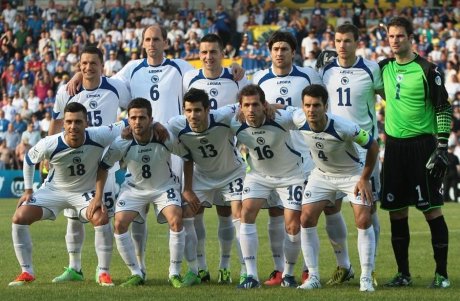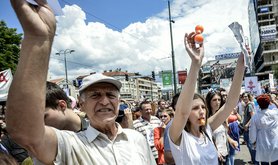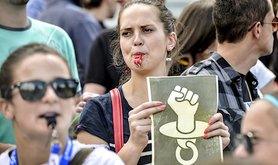
The multi-ethnic, multi-religious Bosnian national football team. Wikimedia commons/pogled u nebo. Some rights reserved.
On Tuesday evening, thousands of Bosnians will flock to Kaunas, Lithuania to fill their allocation of seats at the 8,248 capacity Darius and Girenas Stadium. They will be joined in spirit by hundreds of thousands more, not only in Bosnia but across the global Diaspora spanning from the USA to Australia via Europe.
They will sit in front of their TVs and computer monitors, streaming the match, flags clutched in their hands, dressed in knock off Bosnia football shirt replicas, eagerly awaiting what could be the defining moment in the history of Bosnian football. Heartbreak is still on the cards, but with a third straight play-off position guaranteed and a national best of thirteenth in the FIFA world rankings en route, the Bosnian and Herzegovinian international football team has thrown off the shackles of the dark horse underdog tag that it held since it came agonisingly close to automatic qualification for Euro 2004, only to lose out during the last match of the campaign.
Why is this different from any other qualification or match on Tuesday evening? The primary difference is that this match has superseded the level of ‘just a football game’ in Bosnia. The fact that the team has reached the playoff stage for both the World Cup 2010 and Euro 2012 qualifiers, only to fall to a strong Portugal side on both occasions, has created not only a sense of hope, but also a sense of expectation amongst Bosnians and Herzegovinians. Whilst fans of England complain about their current crop of highly paid world class players, predicting their inevitable elimination from the competition, across the continent fans of the Bosnian national team believe that the sky is the limit.
The importance of the national team’s progress however only makes sense when we consider the context the rest of the country finds itself in. The optimism about the national football team is the exception rather than the rule amongst citizens. In fact since the start of the 2010 World Cup qualifying campaign back in 2008, the national football team has been the only shining light in the country plagued by high unemployment (currently at 45%) a stagnating economy (Bosnia’s main trading partner Croatia has now joined the EU, restricting Bosnia’s export market), ever present political corruption, ethnic politics and a dream of EU membership that is just as distant now as it was back in 2008.
The performance of the national team has however been in stark contrast to the performance of the country as a whole. While Bosnian political figures were disagreeing over the minor complexities of canton boundaries and ID numbers during the first half of the 2013, the Bosnian national team defeated former Euro 2004 champions and group favourites Greece at the Biljno Polje stadium in Zenica with a score of 3 - 1.
In a week where the prospect of EU membership seemed to become ever more distant as seven Bosnian political figures failed to come to an agreement on constitutional reforms on their visit to Brussels with Stefan Fule, the Bosnian national team hosted Liechtenstein and put them to the sword with a resounding 4 - 1 victory. The consequences of the former? The withdrawal of at least £40 million worth of EU assistance to Bosnia and Herzegovina. While the latter takes the country one step closer to qualifying for its first major international competition in the country's short history.
The fact is that the national team has not only provided a breath of fresh air but now presents an ideal for the rest of the country, and indeed the international community, to strive for. The national football team represents the image of what Bosnia and Herzegovina could become and should serve as a case study of post-war institution building to the rest of the international community. Much like the rest of the country, the national football team was plagued by corruption and ethnic political disagreements at the higher levels. Because of this, a number of players refused to play for the national team until the problem was addressed. What followed was a string of poor results, culminating in defeat against minnows Moldova.
So what changed? It was in fact pressure from both the bottom up and top down, not excluding a certain level of luck, that resulted in the restructuring of the Football Association (FA) and a boom in the form of the national team. The pressure from the top came in the form of UEFA imposed sanctions in April 2011, preventing Bosnia from playing any matches until it changed the governance structure of its football association. The incumbent system was similar in nature to the rotating presidency of the country as a whole, a system that UEFA needed changed to adhere to those across Europe. The suspension gave the FA a strict deadline to implement the reform or face falling behind the rest of the nations in what became a tightly contested group.
For a reform to pass however, it needs to be agreed upon by both entities in Bosnia: the Federation of Bosnia and Herzegovina and the Republika Srpska, where the process was being held up. This is specifically where the element of luck came into play. At the end of the Bosnian domestic season Borac Banja Luka (from the Republika Srpska) had won the domestic championship for the first time since the competition's creation in 1995, winning a much coveted place in the UEFA Champions league qualifiers. Without the implementation of the reforms, the club would be banned from competing in the tournament. As soon as this became apparent, the reforms were passed without a hitch.
The national team has come a long way since that night in Moldova in October 2007. Qualification for the World Cup will merely cement the progress that has been made. What is perhaps more important about this team is the way it has patched the legacies of the 1992 – 1995 Bosnian war. In this sense, football has done more to achieve success than many other institutions in the country. While ethnic politics has been the norm in Bosnia and Herzegovina, the national football team has shown that an alternative does exist.
The power of football, and sport in general to act as a tool towards reconciliation should in no way be underestimated. During a trip to Sarajevo on the 10 October 2013, FIFA President Joseph S. Blatter praised the Bosnian national team for becoming ‘a symbol of reconciliation and union for the whole country, thus once again demonstrating the powerful role of football in society’. Regardless of your opinion about Sepp Blatter, a man facing his own accusations of corruption, his comment in Sarajevo is not far off the mark.
It is the multi-ethnic make-up of the squad in particular that serves as proof of the capacity for cooperation amongst the three predominant ethnic groups in the country. It was a sublime over the top ball played by Zvjezdan Misimovic (an ethnic Serb and Bosnia’s most capped player) that put Edin Dzeko (an ethnic Bosniak and Bosnia’s record goal scorer) through on goal to open the scoring against Liechtenstein on 11 October. It was this same partnership that made Wolfsburg such an attacking force on its way to the German Bundesliga title in 2009.
The fact is that on the football pitch a pass does not discriminate between a Muslim and an Orthodox Christian. Miralem Pjanic (an ethnic Bosniak) will not refuse a pass from Miroslav Stevanovic (an ethnic Serb) because of events that took place while they were children and were far beyond their control. It is the trust that the goalkeeper Asmir Begovic (an ethnic Bosniak raised in Canada) has in defenders Emir Spahic (an ethnic Bosniak born in Croatia), Boris Pandza (an ethnic Croat) and up until recently Sasa Papac (an ethnic Serb) that has ensured the team has only conceded 6 goals this campaign. For those 90 minutes, any differences are set aside for the good of the team. They may not be forgotten, but for at least those 90 minutes they are not relevant. Maintaining these prejudices would only result in the teams own demise, a lesson that much of the country is yet to learn.
We should however not be under any illusions. The national football team does not reflect the Bosnian society that exists today but merely presents an image of what it could become, given the right conditions. The game on Tuesday, win or lose, will not heal old wounds; it will not ease the economic conditions thousands of people in the country find themselves in; and it will not put Bosnia back on the track towards EU membership.
While the national football team is the dream, club football in the country remains the reality. Club football across the world is by its very nature tribal and divisive, but it is more so the case in Bosnia, where these tribal allegiances with local clubs also become associated with allegiances to ethnic groups. Clashes between fans and supporters of clubs from different ethnic groups are not uncommon. Most recently in April 2013, a large altercation broke out between fans of NK Zeljeznicar Sarajevo (Bosniak) and Borac Banja Luka (ethnic Serb) in which 35 fans and 7 police officers were injured.
Nazi flags have also been an occasional fixture at Siroki Brijeg (ethnic Croat) over the past few seasons. They have been used as a way to antagonize clubs of ethnic Serbian origin in particular. Events such as these illustrate just how long the country has to go before old wounds are healed.
What it will do is provide some much needed relief for a country fatigued with the sluggish EU integration progress, the rising food prices and the ethnic bickering that defines daily political life in the country. More importantly however, it will serve as proof that the current status quo in BiH, whereby politics is seen as a zero sum game between the Federation of Bosnia and Herzegovina and the Republika Srpska is no longer an undeniable fact, but a self sustaining construct that can be altered.
Only once this truth is realised can the country begin to follow in the footsteps of its national football team.
Read more
Get our weekly email


Comments
We encourage anyone to comment, please consult the oD commenting guidelines if you have any questions.